Cooking up a health crisis: Lagos' reliance on firewood and charcoal
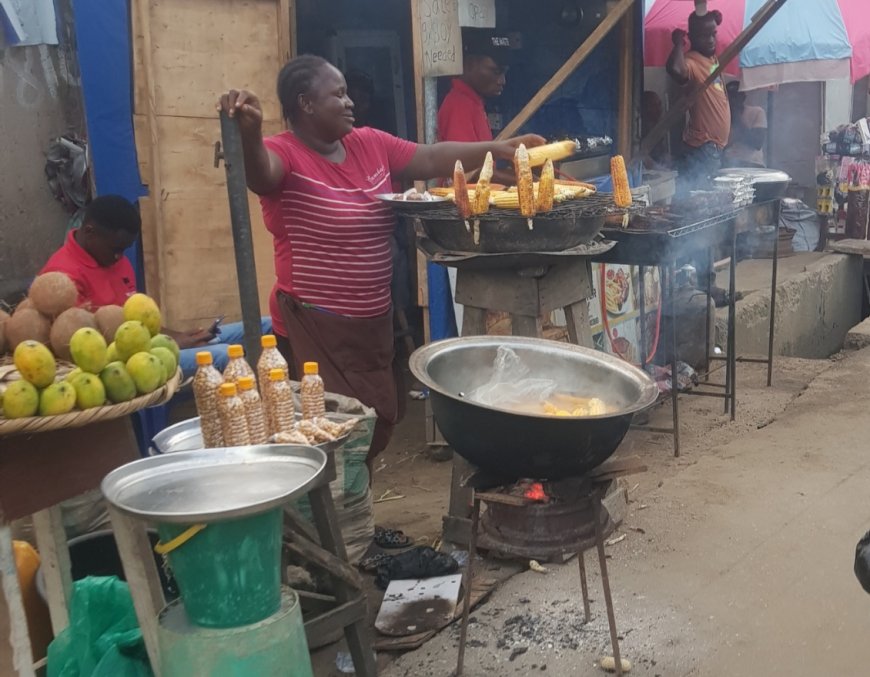
Lagos, Nigeria - October 7, 2024 - Lagos is one of the fastest-growing cities in Africa. The influx of people into the city has led to overcrowded neighbourhoods, where infrastructure struggles to keep pace with the growing population, as many households continue to rely on traditional biomass fuels like wood and charcoal for cooking.
These cooking practices generate significant indoor air pollution, affecting the health of residents, especially in poorly ventilated homes.
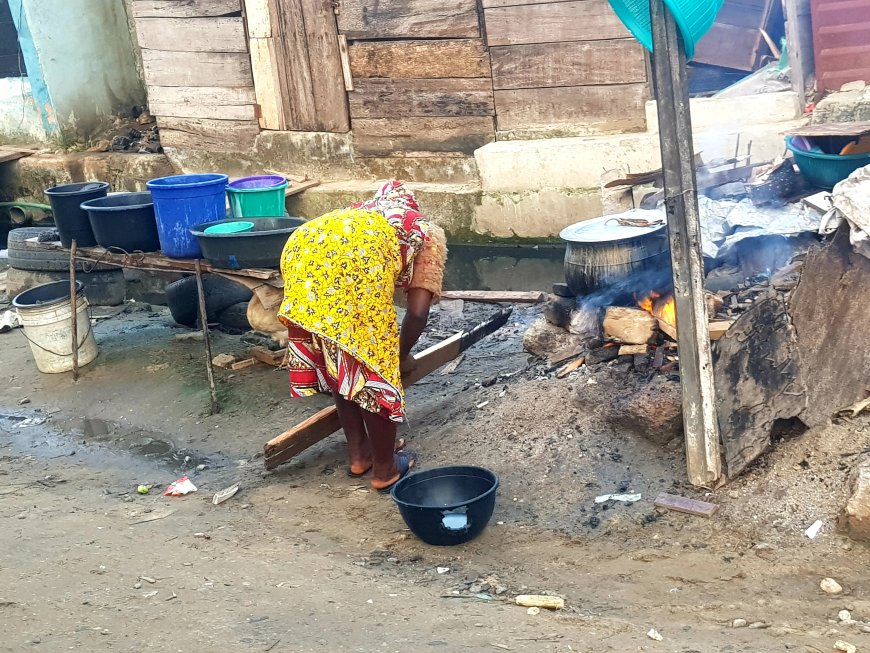 An elderly woman cooking with firewood adjusting the woods to intensify the fire at Wesley Close, Lagos State, Nigeria.
An elderly woman cooking with firewood adjusting the woods to intensify the fire at Wesley Close, Lagos State, Nigeria.
In the bustling streets of Lagos, countless women engage in small-scale food vending activities. These women are constantly exposed to the risks of air pollution by relying on firewood and charcoal to prepare meals for their customers. These cheap and accessible fuels are a staple in the cooking processes of many vendors, but behind the convenience lies a severe public health concern, dangerous air pollution that disproportionately affects women and children.
A World Health Organization (WHO) findings shows that the world remains off course to achieve the Sustainable Development Goal (SDG) 7 which is about ensuring access to clean and affordable energy, efforts remain insufficient to reach universal access to clean cooking by 2030 as 2.1 billion people still live without access to clean cooking fuels and technologies, with the number remaining largely flat. This carries with it huge implications for health and the environment, contributing to 3.2 million premature deaths each year.
The Prevalence of Firewood and Charcoal Usage

A charcoal seller cooking with a charcoal stove with her daughter fanning the charcoal to increase the flames in Alapere, Lagos State, Nigeria
The use of firewood and charcoal is common because they are cheaper and more accessible than modern alternatives like gas stoves. However, the heavy smoke from burning these fuels contains harmful pollutants such as carbon monoxide, nitrogen oxides, and particulate matter (PM2.5), which research shows can lead to serious respiratory problems, including asthma, chronic bronchitis, and lung disease.
In various neighbourhoods across Lagos, firewood and charcoal are the primary fuels for street vendors who prepare foods like soups, rice-based meals such as jollof or ofada. Apart from cooking, other activities like street-side roasting of corn, yam, plantains (boli), grilling meat or fish, and frying bean cakes (akara) also heavily rely on charcoal. These vendors, often stationed by busy roadsides, are subjected to additional pollution from vehicle emissions, exacerbating the already hazardous environment.
For Mrs. Abike Adesola, a food seller in Ketu, firewood is her only option for cooking because it is affordable. “I have five children to feed, and using firewood is cheaper than gas. I make my sales from it, and the little I get goes back to the family. It’s not easy, but that’s what I can afford,” she says while stoking her fire, her eyes reddened from the continuous exposure to smoke.
Similarly, Mrs. Ayomide Suleiman, who sells roasted corn along the road in Alapere, shares her experience. “I’ve been using charcoal for over 5 years. It’s cheap and available, but the smoke can be overwhelming sometimes. My eyes feels pain when smoke gets in, and my chest feels tight after long hours, but there’s nothing I can do. Gas is too expensive for the business,” she laments. Mrs. Suleiman, like many vendors, works long hours by the roadside, inhaling not only smoke from charcoal, but also exhaust fumes from passing vehicles.
Mrs. Esther Nwachukwu, who runs a roadside roasted yam and plantain stand in Ogudu, talks about her concerns. “Every day I roast plantain (boli) with charcoal because it’s affordable, but at the end of the day, my throat feels pain. Sometimes I cough at night. My kids help me sometimes, and I’m worried because they breathe in the smoke too,” she says.
Smoke Exposure: A Daily Reality
For many women food vendors in Lagos, there is a delicate balance between economic survival and health. Firewood and charcoal remain cheap, reliable, and easily accessible, while modern alternatives such as gas stoves are costly and out of reach for most vendors struggling to make ends meet. This reliance on traditional fuels for cooking exposes them to immediate and long-term health risks.
The continuous inhalation of smoke not only endangers the their health but also affects children who may be around, either helping or playing nearby. The situation worsens for women who work indoors often in poorly ventilated spaces, like in small enclosed food stalls, where smoke accumulates faster, increasing their exposure.
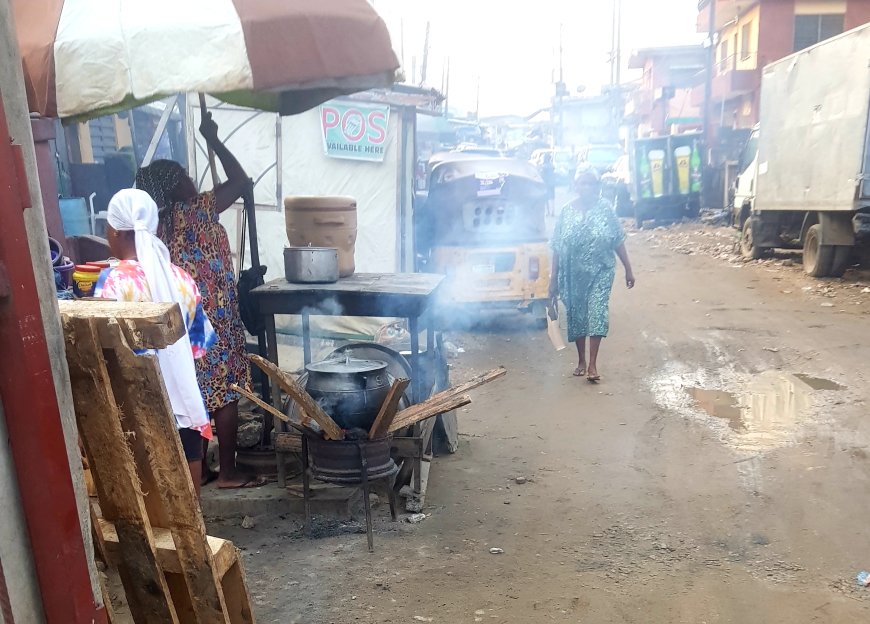 A food vendor cooking with firewood exposed herself, customers and passerby to air pollution as they inhale the smoke released into the air at Balogun Ilewe street, Lagos State, Nigeria
A food vendor cooking with firewood exposed herself, customers and passerby to air pollution as they inhale the smoke released into the air at Balogun Ilewe street, Lagos State, Nigeria
In crowded markets and streets, women like Mrs. Adesola spend hours each day exposed to smoke while cooking for customers. “Sometimes, my eyes bring water, and I cough a lot, but I have to keep working. There’s no other way to make money,” she says, wiping her tear-filled eyes from the effects of smoke. This is the reality for many women vendors whose exposure to smoke leads to short-term symptoms like eye irritation, headaches, and breathing difficulties.
Mrs. Amina Lawal spends her days frying akara (bean cakes) over a charcoal fire. She acknowledges the risks but points out that her income leaves her with no other option. “The smoke from the charcoal is bad, and sometimes I feel it in my chest. Mrs. Lawal says, pausing to clear her throat. “But what else can I do? Gas is too expensive for my kind of business. I need to make a living, so I’m constantly exposed to this smoke every day,” she added.
In addition to women, children are often the silent victims of this exposure. Many accompany their mothers to the food stalls or even help with the cooking, spending hours close to the smoky fires. Many vendors, like Mrs. Nwachukwu, bring their children to their stalls, exposing them to the dangerous fumes. “My children often complain of headaches or coughs, but what can I do? They have to stay with me after school,” she adds.
Mrs. Ifeoma Nwankwo, another food vendor at the Mile 12 market shares her concerns. “Firewood is what I can afford. If I switch to gas, I’ll make less profit, and my customers will not be happy if I increase the price of food,” she explains. “My daughter use to help me. She is always coughing because of smoke, but I don’t have the money to start using gas.”
Struggle for Cleaner Alternatives
Despite the dangers of smoke inhalation, many women feel trapped in their current situations. “I know that this smoke is not good for me, but what can I do? Gas is too expensive,” Mrs. Adesola admits. Like her, thousands of other women in Lagos depend on traditional fuels because alternatives like LPG are out of reach due to cost constraints. “We know the smoke is bad, but we don’t have a choice. If we can get cheaper options or support, it would help people like me,” she added.
“I tried using gas last year, but it was eating into my profits. I had to switch back to firewood,” Mrs. Modupe Afolabi who sells fried yam and akara, explained. “I’m aware that the smoke from charcoal is bad for my health, but I have a family to feed.”
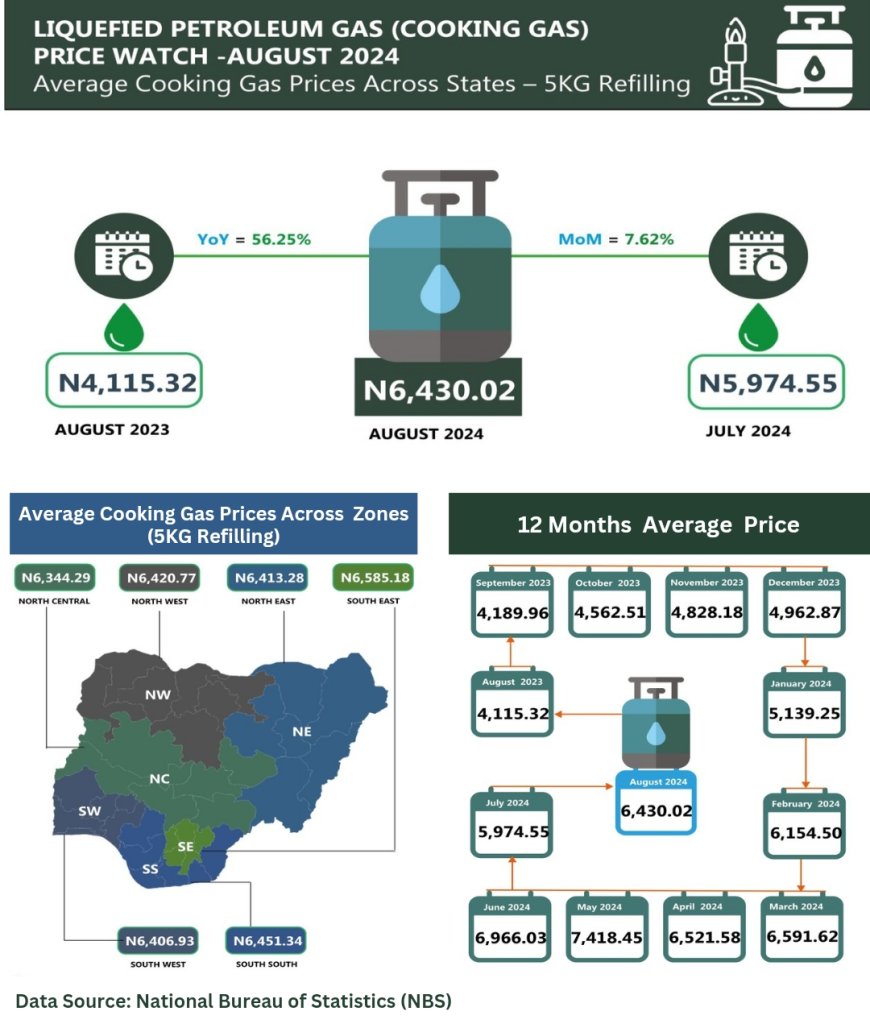
Mrs. Afolabi also highlighted how price fluctuations make gas inaccessible to low-income earners. “There was a time gas prices went up so high I couldn’t even think about it. Currently gas is sold between N1,400 to N1,600 per kg. Charcoal and firewood are the only options I can afford right now.”
The latest data from the National Bureau of Statistics (NBS) highlights a significant rise in the cost of Liquefied Petroleum Gas (LPG) in Nigeria, underscoring growing concerns over affordability and accessibility, particularly for low-income households.
According to the NBS LPG Price Watch, the average retail price for refilling a 5kg cylinder saw a month-on-month increase of 7.62%, rising from ₦5,974.55 in July 2024 to ₦6,430.02 in August 2024. On a year-on-year basis, this represents a 56.25% increase from ₦4,115.32 in August 2023.
Similarly, the cost of refilling a 12.5kg cylinder surged by 9.05% month-on-month, from ₦14,261.57 in July 2024 to ₦15,552.56 in August 2024, marking a staggering 69.15% increase from ₦9,194.41 in August 2023.
The significant fluctuation in the price of Liquefied Petroleum Gas (LPG), reflects a growing challenge for low-income earners in Nigeria, particularly in Lagos, where many people rely on LPG as alternative means for cooking. The growing cost of LPG has the potential to push more people toward alternative cooking methods like firewood or charcoal, which could exacerbate environmental degradation and health risks associated with air pollution.
For many low-income households, the rising cost of gas makes switching to cleaner cooking alternatives unattainable. Women food vendors, street cooks, and small businesses in Lagos who operate on slim margins are hit hard by these price fluctuations. The high cost of gas forces them to stick to cheaper but harmful alternatives like firewood and charcoal.
When LPG prices rise, women like Mrs. Adesola must make difficult decisions between their health and their livelihood. The unpredictable nature of gas prices, fluctuating month to month, creates uncertainty, making it nearly impossible for low-income earners to budget for gas or make long-term switches to cleaner alternatives.
The rising and fluctuating costs of LPG are not just an economic burden but a public health crisis. It traps low-income earners in a cycle where they must choose between their health and their financial survival. Until cleaner, affordable alternatives become available, dangerous air pollution will continue to disproportionately affect vulnerable populations, especially women and children.
Experts Warn of Emerging Public Health and Environmental Crisis
Air quality expert at the Lagos State Environmental Protection Agency (LASEPA), Dare Olasunbo Bola, warned of the significant health and environmental risks posed by the continued use of firewood and charcoal by small-scale businesses in Lagos.
According to Bola, "The use of firewood and charcoal by small-scale businesses significantly contributes to air pollution due to the soot and carbon emissions produced during burning. When individuals nearby inhale these pollutants, it can lead to numerous health issues, ranging from eye irritation to more severe conditions like lung and respiratory diseases."
She explained that the pollutants are not only hazardous to those directly exposed but can also affect highly populated areas due to their ability to spread over long distances. "The pollutants released into the air when firewood and charcoal are burned can impact highly populated areas, as the emissions are not confined to the immediate surroundings but are carried over long distances by the wind. This can particularly affect sensitive groups, including children and individuals with weakened immune systems, increasing their risk of health complications."
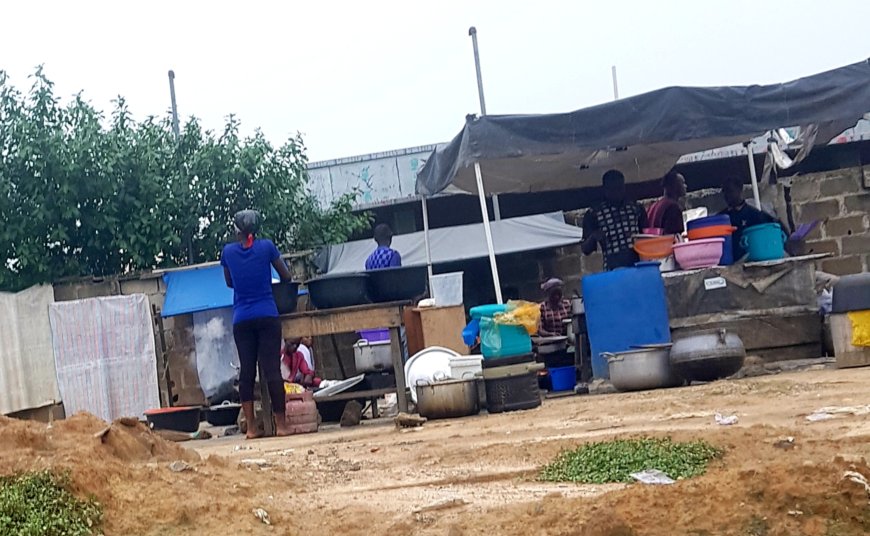 A food vendor cooking with firewood being assisted by her children to cook and serve customers in Ketu, Lagos State, Nigeria
A food vendor cooking with firewood being assisted by her children to cook and serve customers in Ketu, Lagos State, Nigeria
Environmental Health Expert, Alice Ehinmore, raised concerns about the widespread use of firewood and charcoal for cooking in Lagos, warning that the practice significantly contributes to air pollution and global warming. She explained that these traditional methods of cooking emit dangerous gases that pose a serious threat to both human health and the environment.
“The use of firewood and charcoal contributes a great risk to air pollution because they emit dangerous gases into the atmosphere," Ehinmore stated. "The burning of wood and charcoal releases harmful gases like carbon monoxide. These gases, once released, inevitably return to humans, bringing various health issues, particularly respiratory diseases in children."
Ehinmore emphasized that the incomplete combustion of firewood and charcoal leads to the release of greenhouse gases such as carbon dioxide (CO2), nitrogen oxide, and chlorofluorocarbons (CFCs). These gases, she explained, not only degrade air quality but also play a significant role in climate change by trapping heat from the sun and returning it to the earth.
“As these gases go into the atmosphere, they trap heat from the sun and bring it back to the earth. This is where global warming comes in, and with it comes the risk of climate change, leading to disasters like flooding,” she added.
A Need for Urgent Action
The health risks that women and children face from air pollution in Lagos are undeniable. Poor air quality from burning firewood and charcoal in household cooking exposes vulnerable populations to preventable diseases, creating an invisible yet urgent public health challenge.
Dr. Rebecca Nantanda, a pediatrician at the Makerere University Lung Institute in Uganda, underscored the urgent need for action at the CLEAN Air Forum in Lagos. She shared that “The most distressing news is that countries in South Asia and Africa are the most affected in terms of health,” Dr. Nantanda stated. “Populations in low- and middle-income countries are up to four times more affected by the effects of poor air quality.”
Dr. Nantanda emphasized that global statistics often mask the severity of the issue. “At the global level, it may seem that things are not that bad until you bring it home. In African cities and homes, the risk of health effects from poor air quality is up to four times higher. From conception to the end of life, everyone is affected by the quality of the air they breathe.”
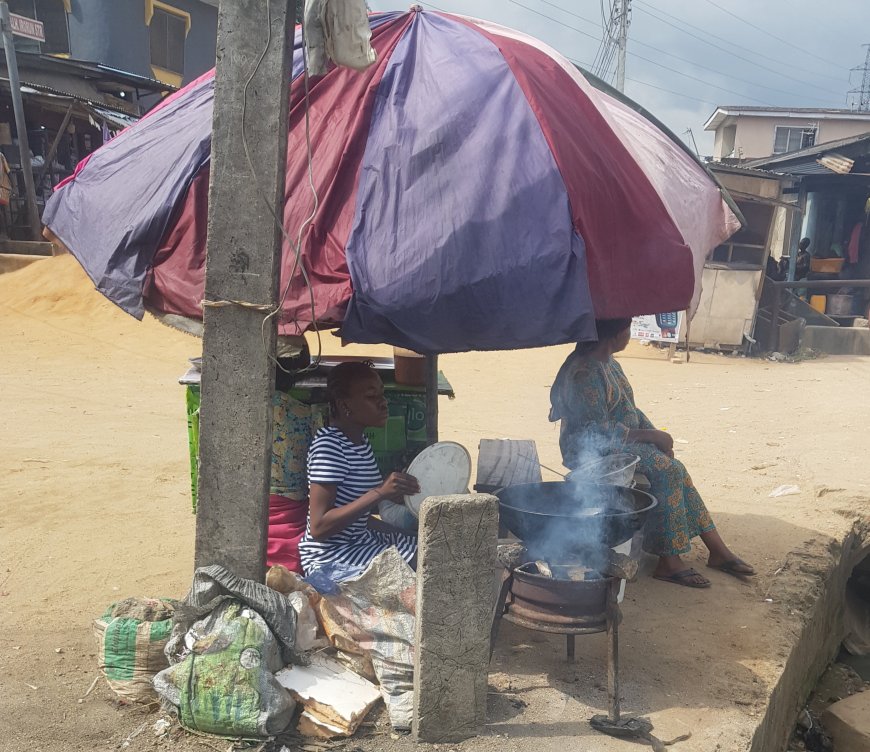 A food vendor frying yam and potatoes over a charcoal fire, being assisted by her daughter in Alapere, Lagos State, Nigeria
A food vendor frying yam and potatoes over a charcoal fire, being assisted by her daughter in Alapere, Lagos State, Nigeria
She elaborated on the profound impact of air pollution on unborn children. “When a mother is pregnant and exposed to poor air quality, those impurities can pass through the placenta to the baby, affecting organ development. By the time these babies are born, they are already impacted by the effects of poor air quality. This is why air pollution is now the second largest risk factor for neonatal death.”
Dr. Nantanda presented alarming statistics, noting that over 700,000 children die annually due to poor air quality. “In Africa and South Asia, the burden is heaviest. Children under five are particularly vulnerable, with air pollution now being the highest risk factor for death in this age group. Historically, malnutrition was the leading underlying risk factor, followed by diseases like malaria and HIV. However, air quality has now surpassed many of these as a leading cause of death” she highlighted.
She emphasized that significant progress has been made in combating diseases like malaria, HIV, and tuberculosis. Yet, air pollution remains a critical, yet often overlooked, public health crisis. “We’ve taken substantial steps to address malaria, HIV, and TB, but air quality is now the second leading risk factor for death, especially among children who are the future of our societies.”
Dr. Nantanda also pointed out the widespread impact of air pollution on adults. “Poor air quality contributes to a high number of deaths from respiratory infections such as pneumonia, viral infections, and TB. It’s estimated that 56% of these deaths are attributable to poor air quality.”
She concluded with a call to action, stressing the immediate need for cleaner air to safeguard health. “We need to bring this issue home and recognize that urgent measures are required. We must act now to clean the air for our children and ourselves. The risk factor is too significant to ignore, and it’s time we prioritize air quality just as we have other major health issues.”
Moving Towards a Cleaner Future
Traditional cooking methods continue to contribute significantly to air pollution in Lagos. Women working in streets, markets, and roadside are particularly vulnerable, facing daily health risks from exposure to smoke and harmful emissions. Their struggle underscores a broader issue of inequality, highlighting the urgent need for sustainable solutions that not only reduce environmental harm but also prioritize the health and well-being of vulnerable residents in Lagos.
Health expert, Alice recommend a shift to renewable energy sources, such as solar energy and hydropower, as cleaner and more sustainable alternatives to firewood and charcoal. “By adopting renewable resources, we can significantly reduce air pollution and, in turn, reduce the impact of these pollutants on human health,” she concluded.
Air quality expert, Bola recommend that small-scale businesses adopt safer alternatives such as gas or electric cooking appliances to mitigate the harmful effects of air pollution. "While they may not be the most affordable options due to economic factors, they are much safer and significantly better for reducing air pollution compared to firewood and charcoal," she noted.
The reliance on firewood and charcoal for cooking is more than just an economic choice; it's a matter of survival for many vendors. These fuels, while affordable, are detrimental to health due to the dangerous pollutants they release, that contribute to respiratory diseases, cardiovascular problems, and other health issues. For many women in Lagos, this is an inescapable reality.
The struggle for cleaner cooking fuels is further exacerbated by a lack of adequate infrastructure and financial support. Low-income earners face significant barriers to accessing cleaner alternatives like LPG. The high cost of gas refills and the absence of affordable cooking stoves make it difficult for vendors to shift from traditional fuels.
Many vendors advocate for government-supported initiatives to make cleaner energy sources more accessible. A subsidized gas program could provide immediate relief by reducing the cost of LPG, making it a viable alternative for those currently reliant on firewood and charcoal. Additionally, programs that provide affordable or subsidized cooking stoves could further ease the transition.
Beyond government support, there is a need for broader adoption of sustainable practices. Public health education can play a pivotal role in raising awareness about the health risks associated with traditional cooking fuels. Educating vendors and the general public about the benefits of cleaner energy sources and proper ventilation can lead to more informed choices and improved health outcomes.
Government policies that support clean energy access, combined with public health initiatives and community engagement, can drive significant progress. Investment in renewable energy infrastructure and technology can also play a crucial role in reducing the city’s reliance on harmful fuels.
By addressing the systemic issues that contribute to the reliance on firewood and charcoal, Lagos can pave the way toward a cleaner future. This involves not only making cleaner cooking fuels more affordable but also ensuring that the shift is sustainable and inclusive.
Source: Collins Odigie Ojiehanor / Lead News Online
The author is a Health and Environmental reporter based in Lagos, Nigeria.
























































